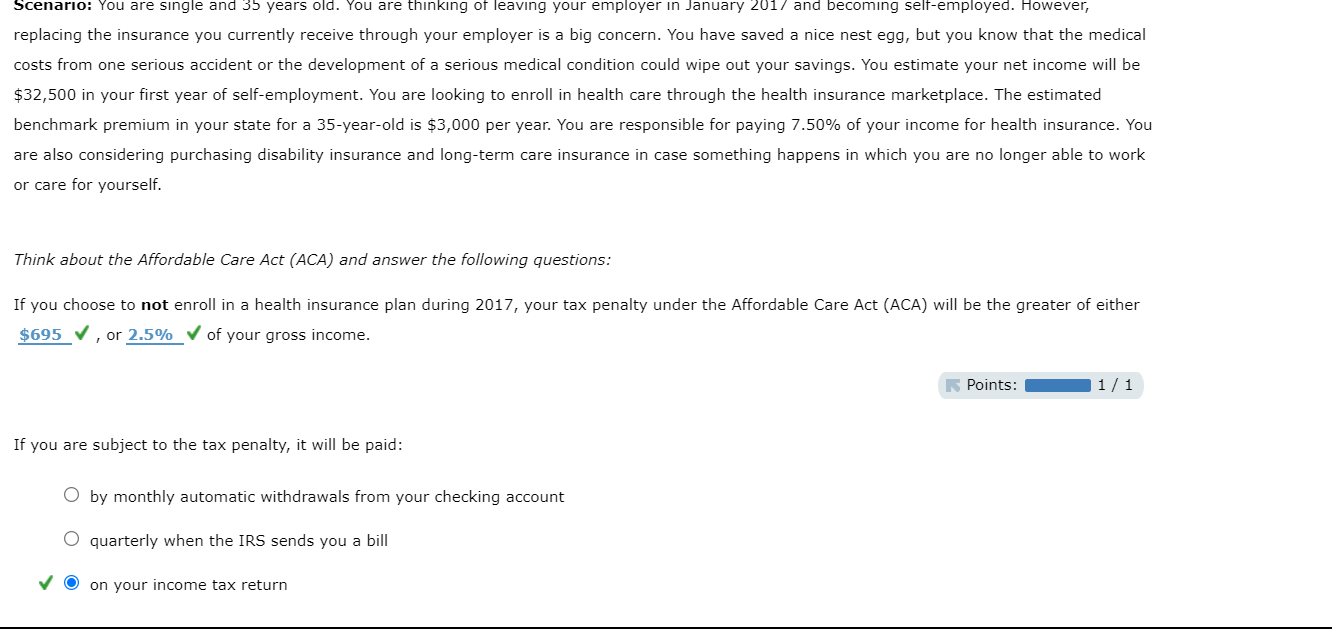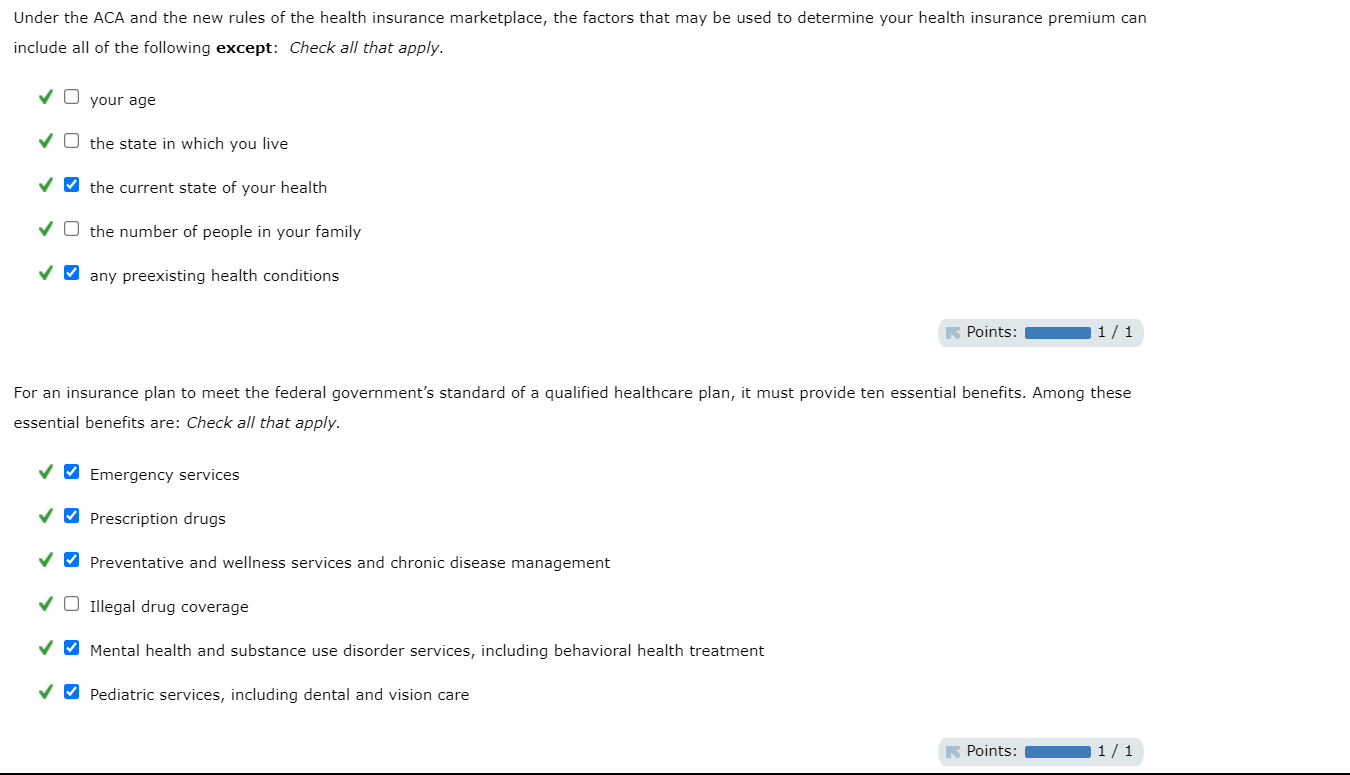Answered step by step
Verified Expert Solution
Question
1 Approved Answer
Scenaro: You are sngle and 35 years old. You are thnkng of leavng your employer in January 201/ and becomng selt-employed. However, replacing the insurance






 Scenaro: You are sngle and 35 years old. You are thnkng of leavng your employer in January 201/ and becomng selt-employed. However, replacing the insurance you currently receive through your employer is a big concern. You have saved a nice nest egg, but you know that the medical costs from one serious accident or the development of a serious medical condition could wipe out your savings. You estimate your net income will be $32,500 in your first year of self-employment. You are looking to enroll in health care through the health insurance marketplace. The estimated benchmark premium in your state for a 35-year-old is $3,000 per year. You are responsible for paying 7.50% of your income for health insurance. You are also considering purchasing disability insurance and long-term care insurance in case something happens in which you are no longer able to work or care for yourself. Think about the Affordable Care Act (ACA) and answer the following questions: If you choose to not enroll in a health insurance plan during 2017, your tax penalty under the Affordable Care Act (ACA) will be the greater of either , or of your gross income. If you are subject to the tax penalty, it will be paid: by monthly automatic withdrawals from your checking account quarterly when the IRS sends you a bill on your income tax return The tax penalty applies to each that you do not have coverage for health insurance coverage for yourself or a member of your household. 'ou are, however, allowed a maximum gap of months before becoming subject to the penalty tax. Under the ACA and the new rules of the health insurance marketplace, the factors that may be used to determine your health insurance premium can include all of the following except: Check all that apply. your age the state in which you live the current state of your health the number of people in your family any preexisting health conditions Points: 1/1 For an insurance plan to meet the federal government's standard of a qualified healthcare plan, it must provide ten essential benefits. Among these essential benefits are: Check all that apply. Emergency services Prescription drugs Preventative and wellness services and chronic disease management Illegal drug coverage Mental health and substance use disorder services, including behavioral health treatment Pediatric services, including dental and vision care The ACA provides for several different tiers of plans to be available through the various federal and state healthcare exchanges. At your age, you can select any one of the plans except for the plan, which covers of the insured's out-of-pocket medical costs. As the plans' tiers progress from bronze to silver to gold to platinum, (1) the percentage of out-of-pocket costs covered by each tier and (2) the cost of the plans included in each of the tiers will . You should expect to pay of your pre-tax income for your health insurance if it is obtained through a federal or state healthcare exchange. The ACA allows for several types of tax credit subsidies, including income-based tax credits. One such credit can be based on a benchmark premium, which in your current situation, is worth and equal to the cost of the plan in your geographic area. Therefore, the amount of the tax credit is expected to be , and means that you should expect to pay tax basis (rounded to the nearest whole dollar) for your health insurance coverage. One possible solution to the lack of health insurance if you elect to leave your current job is to rely on COBRA coverage. Which of the following statements regarding COBRA and its provisions is true? Check all that apply. COBRA rules apply if your employer has more than 20 workers. COBRA rights also apply to your dependents, and provides them with 24 months of additional coverage under your former employer's health plan. You must exercise your COBRA rights within 90 days after you leave your former employment. Under COBRA, you can remain a member of your group health plan for up to 18 months after you leave the job provided that other restrictions are met. You make changes in your health insurance coverage either during the open enrollment period or if you or your family experiences a defined important family event
Scenaro: You are sngle and 35 years old. You are thnkng of leavng your employer in January 201/ and becomng selt-employed. However, replacing the insurance you currently receive through your employer is a big concern. You have saved a nice nest egg, but you know that the medical costs from one serious accident or the development of a serious medical condition could wipe out your savings. You estimate your net income will be $32,500 in your first year of self-employment. You are looking to enroll in health care through the health insurance marketplace. The estimated benchmark premium in your state for a 35-year-old is $3,000 per year. You are responsible for paying 7.50% of your income for health insurance. You are also considering purchasing disability insurance and long-term care insurance in case something happens in which you are no longer able to work or care for yourself. Think about the Affordable Care Act (ACA) and answer the following questions: If you choose to not enroll in a health insurance plan during 2017, your tax penalty under the Affordable Care Act (ACA) will be the greater of either , or of your gross income. If you are subject to the tax penalty, it will be paid: by monthly automatic withdrawals from your checking account quarterly when the IRS sends you a bill on your income tax return The tax penalty applies to each that you do not have coverage for health insurance coverage for yourself or a member of your household. 'ou are, however, allowed a maximum gap of months before becoming subject to the penalty tax. Under the ACA and the new rules of the health insurance marketplace, the factors that may be used to determine your health insurance premium can include all of the following except: Check all that apply. your age the state in which you live the current state of your health the number of people in your family any preexisting health conditions Points: 1/1 For an insurance plan to meet the federal government's standard of a qualified healthcare plan, it must provide ten essential benefits. Among these essential benefits are: Check all that apply. Emergency services Prescription drugs Preventative and wellness services and chronic disease management Illegal drug coverage Mental health and substance use disorder services, including behavioral health treatment Pediatric services, including dental and vision care The ACA provides for several different tiers of plans to be available through the various federal and state healthcare exchanges. At your age, you can select any one of the plans except for the plan, which covers of the insured's out-of-pocket medical costs. As the plans' tiers progress from bronze to silver to gold to platinum, (1) the percentage of out-of-pocket costs covered by each tier and (2) the cost of the plans included in each of the tiers will . You should expect to pay of your pre-tax income for your health insurance if it is obtained through a federal or state healthcare exchange. The ACA allows for several types of tax credit subsidies, including income-based tax credits. One such credit can be based on a benchmark premium, which in your current situation, is worth and equal to the cost of the plan in your geographic area. Therefore, the amount of the tax credit is expected to be , and means that you should expect to pay tax basis (rounded to the nearest whole dollar) for your health insurance coverage. One possible solution to the lack of health insurance if you elect to leave your current job is to rely on COBRA coverage. Which of the following statements regarding COBRA and its provisions is true? Check all that apply. COBRA rules apply if your employer has more than 20 workers. COBRA rights also apply to your dependents, and provides them with 24 months of additional coverage under your former employer's health plan. You must exercise your COBRA rights within 90 days after you leave your former employment. Under COBRA, you can remain a member of your group health plan for up to 18 months after you leave the job provided that other restrictions are met. You make changes in your health insurance coverage either during the open enrollment period or if you or your family experiences a defined important family event Step by Step Solution
There are 3 Steps involved in it
Step: 1

Get Instant Access to Expert-Tailored Solutions
See step-by-step solutions with expert insights and AI powered tools for academic success
Step: 2

Step: 3

Ace Your Homework with AI
Get the answers you need in no time with our AI-driven, step-by-step assistance
Get Started


